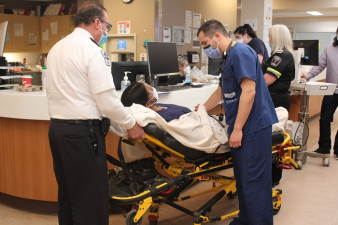
1. What is a Primary Care Doctor? Your First Point of Contact for Health
A primary care doctor is a medical professional trained to address a wide range of health concerns for patients of all ages. Their role includes:
l Preventive Care: Routine vaccinations, screenings (e.g., blood pressure, cholesterol), and annual physical exams to catch issues early.
l Acute Illness Treatment: Managing common illnesses like colds, infections, or injuries, and determining when specialist referral is needed.
l Chronic Disease Management: Developing personalized plans for diabetes, hypertension, or asthma, ensuring long-term control and quality of life.
l Health Education: Advising on nutrition, exercise, mental health, and disease prevention strategies tailored to your lifestyle.
2. Why You Need a Primary Care Doctor: 5 Critical Benefits
a. Continuity of Care: Build Trust, Improve Outcomes
A primary care physician who knows your medical history, allergies, and family health risks can deliver care. Studies show patients with long-term PCP relationships have:
l 20% lower hospitalization rates for preventable issues like diabetes complications.
l Fewer medical errors, as consistent providers understand your full health picture.
l Better mental health outcomes, with regular check-ins that address stress, anxiety, or depression.
b. Preventive Focus: Stop Problems Before They Start
Primary care is rooted in preventive care services, Your doctor will:
l Recommend age-appropriate screenings (e.g., mammograms, colonoscopies) to detect early-stage diseases.
l Create wellness plans to reduce risks of heart disease, stroke, or obesity through diet and exercise.
l Vaccinate you and your family against preventable illnesses, protecting both individual and community health.
c. Coordinated Healthcare: Navigating a Complex System
When specialists, tests, and medications are needed, your primary care doctor acts as a quarterback:
l Referring you to trusted specialists (e.g., cardiologists, endocrinologists) with proven track records.
l Interpreting lab results and ensuring treatments from different providers work together safely.
l Managing medication lists to avoid dangerous interactions—a critical service for patients on multiple drugs.
d. Accessibility & Convenience: Your Local Health Partner
A local PCP offers:
l Same-day or urgent appointments for acute needs, reducing reliance on costly emergency rooms.
l Telehealth visits for minor concerns, making care accessible even when you’re homebound.
l Familiarity with local resources, from physical therapists to mental health clinics, to streamline your care journey.
e. Cost-Effective Care: Save Money in the Long Run
While specialized care is essential for complex issues, primary care acts as a cost-control mechanism:
l Early intervention through screenings and checkups reduces the need for expensive emergency treatments.
l Insurance plans often offer lower copays for PCP visits, encouraging regular use of preventive services.
3. How to Find the Right Primary Care Doctor: A Step-by-Step Guide
Step 1: Define Your Needs & Priorities
Start by clarifying what matters most:
l Specialty Focus: Some PCPs specialize in "pediatric primary care" or "geriatric medicine"—choose one whose expertise aligns with your family’s demographics.
l Care Style: Prefer a doctor who emphasizes holistic wellness (nutrition, mental health) or one with strong hospital affiliations for complex cases?
l Insurance Coverage: Use your insurer’s directory to find "primary care doctors accepting new patients" who are in-network.
Step 2: Research Credentials & Reputation
l Board Certification: Ensure they’re certified by organizations like the American Board of Family Medicine (ABFM) or American Board of Internal Medicine (ABIM)—a marker of rigorous training.
l Patient Reviews: Check platforms like Healthgrades or Google Reviews for feedback on communication, wait times, and bedside manner.
l Hospital Affiliations: Doctors with privileges at top local hospitals may offer smoother transitions for emergencies or surgeries.
Step 3: Schedule a "Meet and Greet" Visit
Most practices welcome initial consultations. Ask key questions to assess fit:
l What is your approach to preventive care and patient education?
l How do you handle after-hours emergencies or urgent concerns?
l Do you use electronic health records (EHRs) for easy access to my medical history?
A good PCP should make you feel heard, explain options clearly, and demonstrate a commitment to your unique needs.
Step 4: Make the First Appointment
Come prepared with:
l Your medical history, including past surgeries, allergies, and current medications.
l A list of symptoms or concerns you want to address, even if they seem minor.
l Insurance information and any referrals if you’re transferring from another provider.
4. Common Misconceptions About Primary Care Doctors
Clear these up to prioritize your health:
l “I only need a doctor when I’m sick.”
l Regular checkups (even when symptom-free) are critical for early disease detection—think of your PCP as a wellness coach, not just a sick-care provider.
l “Specialists are better for complex issues.”
l PCPs excel at coordinating care across specialists, ensuring your treatment plan is cohesive and avoids duplication.
l “All primary care doctors are the same.”
l Their training varies: "family medicine doctors" treat all ages, while "internal medicine physicians" focus on adults—choose based on your needs.
5. The Bottom Line: Your Health Starts Here
A primary care doctor is an investment in your family’s well-being, offering preventive focus, continuity, and advocacy that no single specialist can match.



